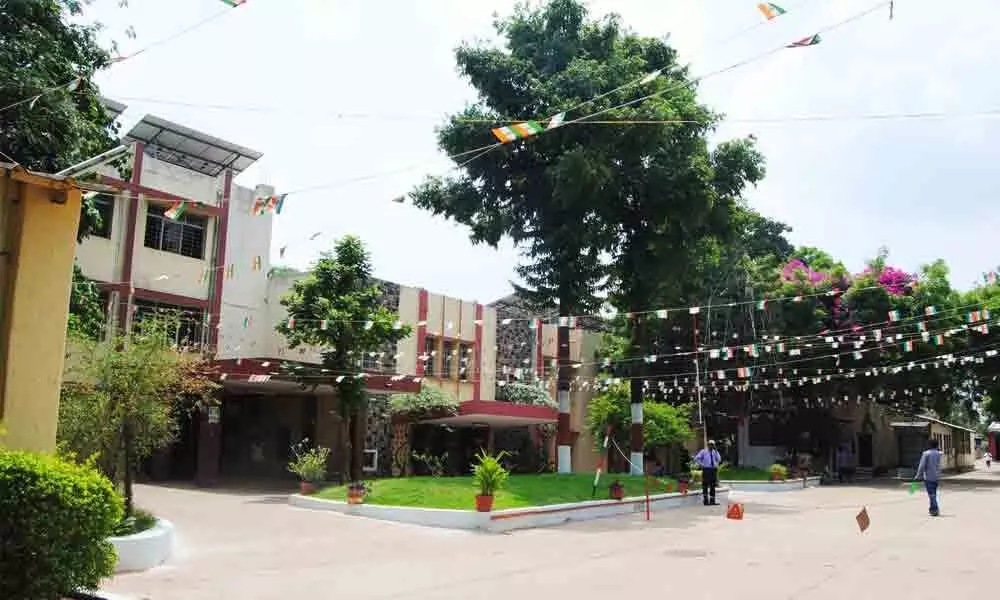Live
- NASA Tracks Five Giant Asteroids on Close Approach to Earth Today
- Pushpa 2 Hits ₹1000 Crore in 6 Days: How It Compares to Other Top Indian Films
- Vivo X200 and X200 Pro Launched in India: Price, Specifications, and Features
- Nitin Gadkari Admits Feeling Embarrassed at Global Summits Over Rising Road Accidents in India
- Comprehensive Review on Indiramma Housing Survey and Welfare Initiatives Conducted via Video Conference
- Jogulamba Temple Records Rs 1.06 Crore Hundi Revenue in 150 Days
- Opposition Slams ‘One Nation, One Election’ Bill as Anti-Democratic; BJP Allies Support the Move
- Celebrate Karthigai Maha Deepam Virtually with Sri Mandir’s LIVE Darshan Experience
- BJP Extends Support to Samagra Shiksha Abhiyan Employees' Strike, Demands Immediate Regularization and Welfare Benefits
- Dr. M. Priyanka Stresses Quality Education, Nutritious Meals, and Cleanliness in Schools
Just In
Historic 'Koranti': Nizam's idea to grapple with pandemic


The Covid-19 pandemic has put the health infrastructure in the country under severe stress given the fact that the spending on the health sector is a meagre 1.28 per cent of the GDP.
The Covid-19 pandemic has put the health infrastructure in the country under severe stress given the fact that the spending on the health sector is a meagre 1.28 per cent of the GDP.
But, in Telangana State, the foundations for quarantine facilities were laid by the visionary Mir Osman Ali Khan, the Seventh Nizam, who had set up the Fever Hospital (Quarantine Hospital) (also known as Koranti Dawakhana) in Hyderabad over 100 years ago.
Telangana was then a part of the Princely state of Hyderabad. Today, the hospital has been selected as one of the nodal centres for coronavirus even as the State government scrambles to ramp up health infrastructural facilities to grapple with the pandemic.
History records that the Nizam, architect of Hyderabad, had constructed the Quarantine Hospital, Koranti-probably an Urdu/Telugu corrupted form of 'quarantine' as it was considered "outside city limits."
Tracing the roots of the hospital, Prof Giridhar, Head, Department of Ancient History and Archaeology, Osmania University, points out that the idea to have such quarantine facilities was conceived by the then residency surgeon and the Nizam to isolate people from the general population following the 1908 Musi floods that claimed several lives and put the health infrastructure under severe stress.
People suffered from water-borne diseases and were afflicted with communicable ailments and deaths soared by the day. Large numbers were down with cholera and typhoid which spread across the State of Hyderabad.
These epidemics and the difficult circumstances in which scores of people died called for setting up special isolation centres in Hyderabad.
Patients from places as far as Karnataka and Maharashtra, part of the princely State, came here for treatment, he adds.
The Fever Hospital was originally located at Errannagutta, a small hillock opposite the current Fever Hospital and was run by a skeletal staff of nurses and doctors in makeshift facilities.
The hospital functioned from here during the years 1915-1923 and was later shifted to its current location on 13.5 acres of land.
In 1998, Fever Hospital was renamed as Sir Ronald Ross Institute of Tropical Diseases after Sir Ronald Ross, who won the Nobel Prize in medicine in 1902.
Ross made his discovery in 1897 at the Ronald Ross Institute of Parasitology, Begumpet. He proved that the parasite in the mosquito when transmitted to human beings through a mosquito bite causes malaria.
Koranti Hospital is the first call for many and is flocked by people from diverse sections of the society for diseases such as diphtheria, diarrhoea, measles, mumps, cholera and hepatitis.
Renuka, a domestic help, visited several hospitals in Uppal to get her son treated for stubborn fever and was suggested to visit fever hospital.
"I am glad that I visited this hospital as the fever subsided after administering the medicines prescribed at the hospital," she points out and adds that people's perceptions about government hospitals have to change.
Doctors are experienced and their diagnosis and the line of treatment are perfect as they come across a variety of cases. The Fever Hospital is a loud testimony to the benefits of investing in the heath sector during normal times and during crises.
Acknowledging the fact that the health of its population holds the key to the financial health of the State, the current Telangana government in its second term planned to compile a health profile of all the people.
An amount of Rs 6,186 crore has been proposed in the budget to the health sector and the government has decided to enhance the number of 'Basthi Dawakhanas' (neighbourhood clinics) to 350. "Thus, the government will start another 232 Basthi Dawakhanas shortly.
Apart from starting 2 dawakhanas for every division, the government will establish more Basthi Dawakhanas in places where SCs, STs, Minorities and poor people are residing," according to Finance Minister Harish Rao.

© 2024 Hyderabad Media House Limited/The Hans India. All rights reserved. Powered by hocalwire.com






